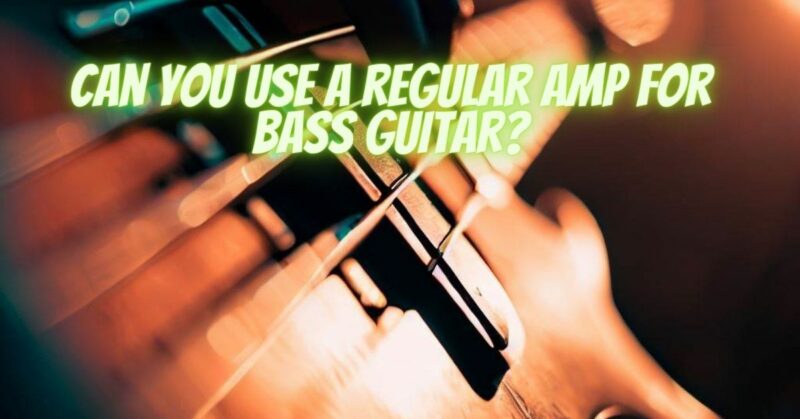Musicians often explore different sonic avenues, seeking ways to achieve unique tones and textures. When it comes to amplifying a bass guitar, the question arises: can you use a regular guitar amp? In this article, we’ll delve into the considerations and potential outcomes of using a regular amp for your bass guitar, helping you make an informed decision about this unconventional pairing.
1. Understanding the Basics
Guitar and bass amps are designed with different sonic characteristics and frequency ranges in mind. While guitar amps are tailored to emphasize midrange and treble frequencies, bass amps are crafted to handle the lower frequencies that bass guitars produce. Bass amps also typically have larger speakers and more robust power sections to accommodate the lower frequencies.
2. Can You Use a Regular Amp for Bass?
Technically, you can plug your bass guitar into a regular guitar amp, and sound will come out. However, there are several important factors to consider before doing so:
- Frequency Response: Regular guitar amps might not handle the low frequencies of a bass guitar effectively, leading to a loss of depth and power in the sound.
- Speaker Size: Bass guitar requires larger speakers to accurately reproduce the low frequencies. Regular guitar amps often have smaller speakers optimized for higher frequencies, which might result in distortion or damage when used with a bass.
- Power Handling: Bass frequencies demand more power from an amp’s power section. Using a regular amp with insufficient power handling for bass can result in overheating and potential damage.
3. Potential Outcomes
- Tonal Thinning: Using a regular amp for bass might result in a thin and trebly tone, lacking the depth and punch that bass amps provide.
- Speaker Damage: Playing bass through a regular amp with small speakers can cause them to vibrate excessively and lead to speaker damage, as bass frequencies require more displacement.
- Amp Strain: Bass frequencies put a significant load on an amp’s power section. Using a regular amp could strain its components and reduce its lifespan.
4. Mitigating Risks
If you’re in a situation where you must use a regular amp for bass, there are steps you can take to minimize risks:
- Low Volume: Keep the volume low to reduce strain on the amp’s components.
- Use EQ Wisely: Adjust the amp’s EQ to emphasize midrange frequencies and reduce bass frequencies.
- External Speaker: Connect an external bass cabinet with appropriate speakers to handle the low frequencies.
5. Ideal Scenario: Bass Amp
To achieve the best sound quality and longevity for your bass guitar, using a dedicated bass amp is recommended. Bass amps are specifically designed to reproduce the full range of bass frequencies while ensuring durability and tonal integrity.
While it’s technically possible to use a regular amp for your bass guitar, it comes with risks and compromises that can affect sound quality and equipment health. If you’re in a pinch, careful adjustments and low volumes can help mitigate some of these issues. However, for optimal results and to preserve the life of your equipment, investing in a dedicated bass amp is the ideal solution. This ensures that you can fully explore the rich and powerful tones of your bass guitar without compromising your sound or your gear.


